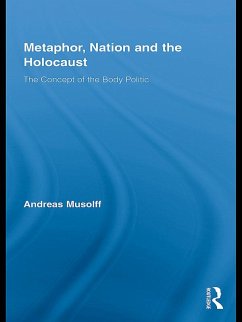The book analyses the conceptual and discursive traditions that underlay the Nazi use of body, illness and parasite metaphors in their genocidal anti-Semitic ideology. Part I gives a detailed analysis of this metaphor field in Hitler's Mein Kampf and his public statements from the 1920s to 1945, when it served him and the Nazi propaganda machine to announce, justify and defend his main policy decisions to destroy European Jewry. The book also studies the evidence from secret surveillance reports and diaries that demonstrates the impact of the body-parasite metaphor complex on popular opinion in Germany 1933-1945 and in the post-war period. Part II of the book traces the history of this metaphor field back to the Middle Ages and the Renaissance when the concept of the (nation) state as a body emerged as a framework for political theory. After its translation into the European vernacular languages, the concept followed different discursive careers related to the divergent political cultures. The reconstruction of its German discourse history, reaching from Luther to the 20th century (and still continuing) shows that whilst there was no linear development towards the racist-genocidal applications of the metaphors in Nazi ideology, parts of the concept's discourse history served as the basis for Holocaust ideology and propaganda and that its use deserves continued critical attention.
Dieser Download kann aus rechtlichen Gründen nur mit Rechnungsadresse in A, B, BG, CY, CZ, D, DK, EW, E, FIN, F, GR, HR, H, IRL, I, LT, L, LR, M, NL, PL, P, R, S, SLO, SK ausgeliefert werden.


